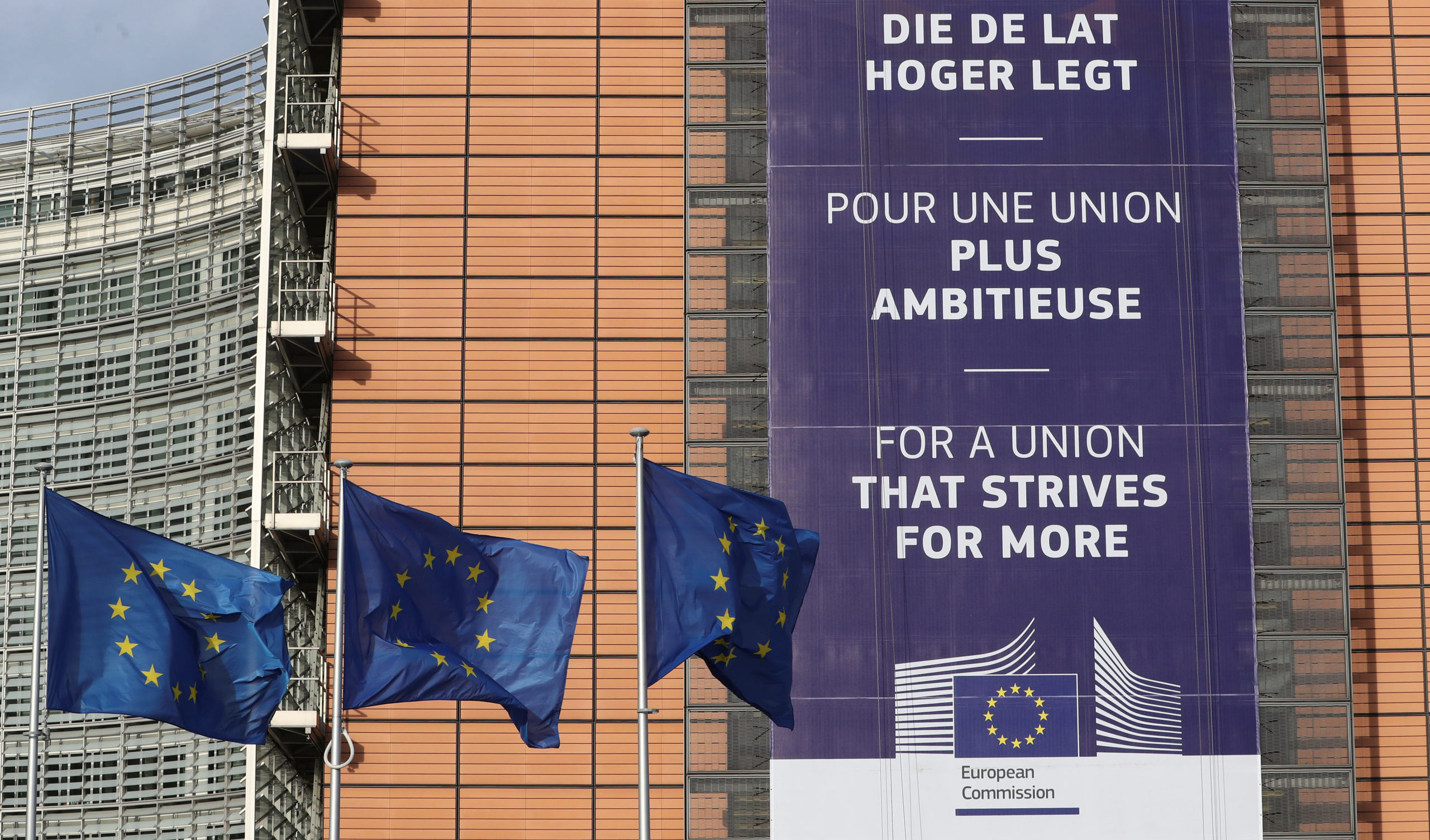Pictured: Nicola Gratteri
By Dan Byrne for AMLi
The single currency and removal of borders has made life a lot easier for the criminals, concluded Italian Public Prosecutor Nicola Gratteri.
Gratteri, who knows a thing or two about the methods used by the money launderers given his role, delivered the keynote address at the European Commission hearings Wednesday afternoon.
A team of panellists from various backgrounds came together to discuss threats of money laundering in the unique political environment of the EU, and how the bloc can take face those threats.
Here are six key takeaways from the afternoon:
1. Dombrovskis – “We have heard your calls.”
Commission Executive Vice President Valdis Dombrovskis was eager to make it clear that the Commission had listened to the feedback it received.
His opening speech was brief but stayed true to the Commission’s original proposals as set out in April, specifically regarding the proposed EU supervisory authority and ‘common rulebook.’
Giving little emotion away, Mr Dombrovskis nevertheless seemed subtly pleased in reporting that the feedback on those original proposals was largely positive.
The Latvian politician did not elaborate on the nature of any negative feedback received.
The next step, he said, was to present a comprehensive package of AML proposals in the first quarter of 2021.
In the meantime, he stressed that the underlying principle of these efforts was that all member states must work together to ensure AML rules are applied and enforced consistently.
2. The ‘common rulebook’ approach is immensely popular.
The core goal of centralised laws with single supervision is being strongly welcomed and the Commission will push ahead with this proposal next year.
“A system is only as strong as its weakest link,” Mr Dombrovsksis said in his opening address. “The single rulebook will strengthen and align AML regulations for all countries. It’s not about creating regulations for the sake of it, but to make sure the same rules apply across the market.”
He has proposed the transformation of current AML directives into more robust AML laws, as well as a bloc-wide supervisory body to enforce them.
How far that supervisory body’s powers will stretch remains a matter for discussion. But the core idea was strongly embraced by panellists at the hearing, whose expertise ranged from politics, to financial management to banking.
Chairperson of the European Banking Authority (EBA) José Manuel Campa said his organisation “was very happy” that an initiative for a supervisor was now in place.
Finnish MEP Eero Heinäluoma said that he was “proud that the industry is talking in favour of regulation. Trust is good, control is better.”
Meanwhile, Director of Horizontal functions and Integrity Supervision at De Nederlandsche Bank Willemieke van Gorkum praised the idea’s potential to observe the entire EU market as opposed to national authorities being limited to their internal markets.
She cautioned, however, that implementation should come on a phased basis, and not so broad and immediate as to be unable to cope.
“It should start with banks because of the high money laundering risk that they run,” she told the hearing. “Then move on to other financial institutions like money transfer, and non-financial institutions.”
3. There is a big gap between rule-compliance in principle and in practice
“A box ticking approach,” was the term Mr Campa used to describe the current AML framework in the EU.
Panellists may have shown broad respect the strides the bloc has already taken to counter money laundering, but they were also in agreement that those strides focused too heavily on principle rather than practice.
“We are looking for formal compliance rather than effective compliance,” Mr Campa said.
This was the heart of the argument made by European Greens MEP Sven Giegold of Germany.
He told the hearing that although the European Commission performed widespread checks to see if its AML directives are being incorporated into states’ national laws, they didn’t check if states were actually enforcing those laws.
“Since 2007, we have had strong regulations in Europe. Before we speak about new ones, the first thing is to prioritise implementation,” he said. “My call to the commission is to start enforcing the law, not comparing legal texts”
4. The EU supervisor needs legal powers but which ones?
It harks back to the that delicate debate over how control is balanced in the EU.
The new EU supervisor would need to work across internal EU borders which, while important for legal national sovereignty, matter little to criminals who operate a global business.
The main question raised was whether the supervisor would be entitled to conduct its own independent investigations into a case, and what right it should have to issue punishments if it found wrongdoing.
The panellists were, in general, leaning towards the supervisor having more rights as opposed to more limits.
Director-General of the French Treasury Odile Renaud-Basso said that an EU supervisor should have the right to monitor supervision by national watchdogs, and the right to maintain a strong on-the-ground presence with control powers to back that up.
“It’s important that there is an EU level supervision to deliver concrete results swiftly,” she told the hearing.
MEP Eero Heinäluoma took a more conservative stance on the supervisor’s role, recognising that the national watchdogs currently did “90% of the work” and deserved recognition for that.
He proposed a more collaborative partnership between the EU supervisor and the national watchdogs, with the EU entity only stepping in when it emerges that there have been gaps in the national probes.
“I’m in favour of a supervisory authority that can make its own enquiries, but that is not the first phase,” he told the hearing. “The EU should have the power to make enquiries only after it has seen that the national authority has fallen short in their in investigations.”
On the other side, MEP Sven Giegold was a vocal critic of the current proposals for not going far enough.
“It’s truly disappointing that the council is making a long list of conditions of what the FIU should have the right to do or not do. The Council should move into the positive spirit of enabling a strong community rather than sending signals to the Commission on what it shouldn’t propose.”
He said the EU supervisor ought to have enough independence from national agencies to take what he described as “institutional decisions in the logic of a communal institution.”
“It’s important that a European body is not member-driven but community driven,” he said.
5. The banks want clarity and coherency across borders, so they know who to report to and what to report
The reputational damage done to some of the world’s biggest banking names by FinCEN left many scrambling to explain why so much dirty money has passed through their channels over such a long period, without action.
Swedbank CEO Jens Henriksson told the hearing that, “the only way to come to terms with the problem is through dialogue between banks and regulators.”
Swedbank has been contacted by the Swedish financial watchdog multiple times over its role in financial crime scandals – most recently in September.
Henriksson acknowledged this and advised that Swedbank’s shortcomings were rooted in the lack of “satisfactory governance and internal control” – something he said was being addressed through finding faults, closing gaps in AML systems, and refining future ambitions.
However, he did say that the bank struggles with the issue of reporting to the relevant FIUs across Europe, and with the amount of information exchanged.
The FinCEN leak showed that although banks allowed their channels to be used to alleged laundering on a large scale – they did report most of this to the relevant authority in the form of suspicious activity reports (SARs).
Doubts have been raised over the authorities’ capacity to deal with the volume of these reports, and Henrikkson criticised the trend of hearing nothing back once they have been filed.
“In many cases, the FIUs don’t give any indication as to whether those reports are relevant,” Henriksson explained. “Any new regime must encourage feedback from the FIUs to the banks. Banks need timely access to information from authorities.”
6. The EU is moving in the right direction for AML, and is a global standard-setter but it’s not enough.
It was an assessment of two halves: yes the EU is making strides in the AML fight, and yes the bloc is an example for the rest of the world to follow, but it is still not at the level where it can match the capabilities of criminals.
Global Chief Ethics & Compliance Officer at PwC Laurie Callahan Endsley has seen first-hand the difference between AML practice outside and inside the EU.
“The EU is moving ahead of the game,” she told the hearing. “It’s different and faster-acting than the rest of the world. But there is still a lack of harmonisation [across member states].”
MEP Eero Heinäluoma emphasised the fact that only 1% of funds laundered through Europe are confiscated by the authorities.
On beneficial ownership, a common point of contention, MEP Luis Garicano of Spain criticised the fact that registers were “not open or accessible.”
He stressed the need to tighten laws around this, going so far as to suggest that businesses be required to either show their beneficial ownership records to authorities, or leave the market entirely.
Share this on:
Follow us on:








